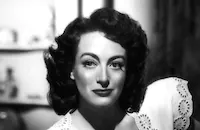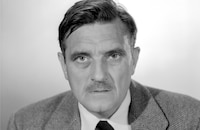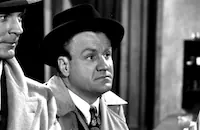The Damned Don't Cry

Brief Synopsis
Cast & Crew
Vincent Sherman
Joan Crawford
David Brian
Steve Cochran
Kent Smith
Hugh Sanders
Film Details
Technical Specs

Synopsis
After the body of well-known racketeer and gambler Nick Prenta is found in Desert Springs, California, the investigating sheriff discovers some home movies in Prenta's house and identifies oil heiress Lorna Hansen Forbes, who has been renting a house in the area, as one of Prenta's guests. When the sheriff tries to question Lorna, however, he learns that she has left town. On further investigation, it becomes evident that the woman has been using a pseudonym and is not who she claims. In fact, her real name is Ethel Whitehead, and she has returned to her poverty-stricken parents, who live in the Texas oil fields. There she remembers her earlier life: Living with her parents and married to Roy, with a young son named Tommy, Ethel is dissatisfied with her life. After Tommy is killed in an automobile accident, Ethel leaves home. In New York City, where she finds a job selling cigars, Ethel meets Wally Talbot, a dress salesman, and soon is working as a dress model. Part of her job is to accompany out-of-town buyers to Grady's, a local gambling club. Later, Ethel meets Martin Blackford, the dress company's accountant, who takes her to dinner at Grady's. After Martin gives Grady some financial advice, Ethel finagles a permanent job for him with the gambler. Grady introduces Martin to other friends of his, and eventually, invites him to a meeting at the home of George Castleman, the head of the syndicate. Although women are not invited, Ethel accompanies Martin, but Castleman will not allow her to attend the actual meeting. Martin is disturbed when he learns the nature of Castleman's business, but Ethel convinces him to take the job he has been offered as a front for a bookie wire service. The following day, Ethel visits Castleman at his office and reveals that she knows he used to be a small-time hood named Joe Cavany. Impressed by her boldness, Castleman offers Ethel a job. Later Ethel turns down Martin's marriage proposal, even though he only agreed to work for Castleman for her sake, because she has fallen in love with the married Castleman. Castleman then hires socialite Patricia Longworth to give Ethel social polish and, using the name Lorna Hansen Forbes, Ethel becomes Castleman's mistress and hostess. When Castleman becomes suspicious of the loyalty of his west coast representative, Nick Prenta, he sends Ethel to California to spy on him. Unexpectedly, Ethel and Nick fall in love, and she neglects to report on his activities. One day, Martin flies to California to warn Ethel that a jealous Castleman intends to kill Nick. That night, Nick holds a meeting to announce his plans to form a rival syndicate. Ethel is recognized by one of the men, and after she leaves, he tells Nick about her relationship with Castleman. When Ethel returns home, Castleman is waiting, but she pretends to know nothing about the meeting until Castleman beats the information out of her. Castleman then forces Ethel to lure Nick to her house so that he can kill him, but before she can telephone, Nick drives up, planning to confront her about her relationship with Castleman, and is killed in her house. Ethel flees to her parents, where she now waits for Castleman to track her down. Martin follows her there, hoping to help her, but before they can escape, Castleman arrives. Martin kills Castleman and Ethel is wounded. Later, a group of reporters speculate that she will again try to leave her past behind.

Director

Vincent Sherman
Cast

Joan Crawford

David Brian

Steve Cochran

Kent Smith
Hugh Sanders

Selena Royle
Jacqueline De Wit

Morris Ankrum
Edith Evanson

Richard Egan
Jimmy Moss
Sara Perry
Eddie Marr
Allen E. Smith
Jamesson Shade
Tom Greenway
Don Forbes
Forrest Dixon
Warren Mace
Paul Mcguire
Dabbs Greer
Charles Jordan
Herschel Dougherty
Ned Glass
Duke Watson
Lee Miller
Kathryn Card
David Leonard
Ralph Sanford
Herb Vigran
Tris Coffin
Weldon Heyburn
Crane Whitley
Diane Delaire
Paul Bradley
William E. Green
Hugh Murray
Rory Mallinson
Keith Richards
Herb Lytton
Leon Lontoc
Bob Alden

Lyle Latell
John Maxwell
Blanche Taylor
Sam Fisher
Jack Gargan
Earl Breitbard
George Baxter
Paul Weber
Crew
Al Alleborn
Daniele Amfitheatrof
Rudi Fehr
Robert Haas
Ray Heindorf
William L. Kuehl
Ted Mccord
Harold Medford
Sheila O'brien
Maurice De Packh
C. A. Riggs
Jerry Wald
Gertrude Walker
Jerome Weidman
Perc Westmore

Photo Collections
Videos
Movie Clip




Hosted Intro
Film Details
Technical Specs

Articles
The Damned Don't Cry
For all its artifice, Gertrude Walker's original story "Case History" was based on the true story of Virginia Hill. Like the film's Ethel Whitehead, Hill had fled a small town to seek her fortune up North. There she worked as a sideshow dancer before hooking up with an accountant with mob connections. This led to an affair with New York gangster Joe Adonis before moving to the West Coast and meeting mobster Bugsy Siegel. Of course, the real appeal of the story for Crawford and Warner's was not its torn-from-the-headlines roots, but its echoes of the star's earlier rags-to-riches stories.
Jerry Wald, who had engineered Crawford's Oscar®-winning comeback in Mildred Pierce (1945), was the producer. This was a delicate point in Crawford's career. Already in her 40s, the star was nearing the expiration date for leading ladies and had begun to show her age. Nor was the new post-war taste for realism particularly favorable to aging actresses who had risen to stardom in more glamorous times. Realizing that Crawford could never convincingly play a teenager frustrated with small-town life, director Vincent Sherman suggested a new beginning to Ethel's story. To age her, he and co-writer Harold Medford wrote a scene depicting her frustrating marriage only held together by her devotion to her 7-year-old son. Sherman worried that Crawford would be insulted by the change, but she saw its wisdom and appreciated the hard-hitting confrontation scene it gave her with Richard Egan (in his first billed role) as her husband.
Sherman had more work than that to do on the script for The Damned Don't Cry. Wald had hired novelist Jerome Weidman, whose I Can Get It for You Wholesale had been a hit in the '30s, to write the screenplay and asked him to do the first draft on his own. As the pages arrived, Sherman was impressed with the swiftness of his writing and the strength of individual scenes, but couldn't help noticing that the script was growing longer and longer. Weidman's first 75 page submission didn't even get the story started, suggesting that the finished screenplay would be about 300 pages, long enough for three films. Wald, however, insisted that Weidman be allowed to finish the script on his own. Crawford expressed similar concerns, prompting a meeting at which Wald finally asked the writer to compress his work. True to Sherman's predictions, he delivered a 300-page screenplay, then returned to the East, leaving director and co-writer to do the compression. Sherman also came up with a new title for the project. It had gone through production as The Victim, but feeling that wasn't a salable title he suggested, after viewing the rough cut, The Damned Don't Cry, which was more descriptive of Crawford's tough title character.
During pre-production, Sherman spoke frequently with Crawford about her scenes and characterization. He found her intelligent and very knowledgeable about filmmaking. In addition, she opened up to him about her painful childhood and other personal issues. Although he had sworn after his affair with Bette Davis while filming Old Acquaintance (1943) never to sleep with another leading lady, the two fell into an affair that lasted throughout the filming. Sherman's wife knew about it, but accepted his assurance that it was just a fling. Crawford, on the other hand, grew increasingly possessive. The only time she gave him any trouble during filming was the day his wife visited the location shoot in Palm Springs (in which Frank Sinatra's home stood in for gangster Steve Cochran's desert getaway). Crawford was noticeably cool to Sherman that day, but the next night, over dinner, asked if he would consider leaving his wife for her. He declined, and the relationship returned to normal. In fact, Crawford insisted on having him direct her next two films, Harriet Craig (1950) and Goodbye, My Fancy (1951).
Critics were not overly impressed with The Damned Don't Cry, but they were divided on Crawford's performance. Howard Barnes of the New York Herald Tribune made the point that the film existed primarily as a vehicle for its star: "The scenario has given Miss Crawford ample scope to emote and show her charms. If it is contrived, it is because the theme is shabby and the incidents too violent for complete plausibility." On the other hand, the New York Times' Bosley Crowther, never a fan of Hollywood glamour, dismissed her performance completely: "Miss Crawford runs through the whole routine of cheap motion-picture dramatics in her latter-day hard-boiled, dead-pan style. As a laborer's wife, she plays it without makeup. As a cigar store clerk and clothes model, she plays it tough....And as the ultimately cultivated 'lady,' she gives it all the lofty dignity that goes with champagne buckets and Palm Springs swimming pools. A more artificial lot of acting could hardly be achieved."
Of course, what Crowther dismissed are the very reasons Crawford's fans adore The Damned Don't Cry. Never intended as a realistic women's picture, it is less a reflection of life than a reflection of Crawford's stardom, a rags to riches tale made just as her career, as the grande dame of the tinsel town soap opera, was coming to an end.
Producer: Jerry Wald
Director: Vincent Sherman
Screenplay: Harold Medford, Jerome Weidman
Based on the short story "Case History" by Gertrude Walker
Cinematography: Ted McCord
Art Director: Robert M. Haas
Music: Daniele Amfitheatrof
Cast: Joan Crawford (Ethel Whitehead/Lorna Hansen Forbes), David Brian (George Castleman), Steve Cochran (Nick Prenta), Kent Smith (Martin Blackford), Selena Royle (Patricia Longworth), Jacqueline deWit (Sandra), Morris Ankrum (Mr. Whitehead), Ned Glass (Taxi Driver), Dabbs Greer (Reporter), Richard Egan (Roy), Herb Vigran (Vito Maggio).
BW-103m.
by Frank Miller

The Damned Don't Cry
The Damned Don't Cry - Joan Crawford in THE DAMNED DON'T CRY on DVD
A largely forgotten gem from Joan Crawford's post-Mildred Pierce days at Warner Bros., The Damned Don't Cry! is a wondrously overwrought potboiler, with Joan's physical appearance and demeanor going through more changes than the romantic leads from Random Harvest. Her fans will get more than their money's worth here as the Hollywood icon gets the spotlight from start to finish, offering the Hollywood equivalent of a fashion show sampler. From mousy housewife to a Cagney-style threat to society, she's always watchable even though her, ahem, maturing appearance pushes the hilarity value through the roof; it's no wonder within three years she pushed her persona straight through to pure caricature with the full-strength camp trilogy of Sudden Fear, Torch Song and Johnny Guitar.
Not surprisingly, Joan overwhelms everyone around her; relative newcomer Brian (who had just appeared with her in Flamingo Road) does what he can with a character that makes little narrative sense, while the reliably bland (and shortly TV-bound) Kent Smith goes through the paces as Martin Blackford, an accountant who initiates poor Ethel into the sweet life. Interestingly, this film marked the first collaboration between Crawford and director Vincent Sherman, most famous for his Bette Davis vehicles like Mr. Skeffington and Old Acquaintance; apparently she was pleased enough to team with him again for the next year's Harriet Craig, a slightly more genteel spin on the same themes from this film.
For some reason The Damned Don't Cry! essentially stayed out of public circulation for several decades, never turning up during on home video and barely rearing its head on television for eagle-eyed viewers. Thus Warner's immaculate edition (also packaged as part of its delicious Joan Crawford Collection) marks the first opportunity for several generations to see this film, thankfully in a sparklingly-transferred edition that makes the most of its overheated noir-style visual scheme (and boasts a presumably intentional, slightly-sepia cast). Sherman's commentary track is fairly engaging, though he tends to narrate onscreen events a bit excessively and seems to linger quite a bit on the fact that he and Crawford were bedmates for a while. Other extras include the slick theatrical trailer and a fun featurette, "The Crawford Formula: Real and Reel," which loads on various Crawford clips intercut with quick soundbites from speakers about Crawford's persona and parallels with this film, which apparently drew some of its inspiration from real-life crime stories.
For more information about The Damned Don't Cry, visit Warner Video. To order The Damned Don't Cry, go to TCM Shopping.
by Nathaniel Thompson
The Damned Don't Cry - Joan Crawford in THE DAMNED DON'T CRY on DVD
Quotes
You're asking for trouble, aren't you?- Ethel Whitehead
I never got anything yet worthwhile, without trouble. Only don't take this for anything more than it's worth.- George Castleman
It might be worth more than you think.- Ethel Whitehead
Trivia
Notes
The film's working title was The Victim. Richard Egan made his film debut in this picture. Some scenes were filmed on location in Palm Springs, CA. According to production notes included in the file on the film at the AMPAS Library, Frank Sinatra's Palm Springs house was used to film the scenes set at "Nick Prenta's" desert home. Other scenes were filmed at the Shadow Mountain Club and the Lone Palm Inn in Palm Springs. On April 5, 1951, a version of the story was broadcast on the Screen Directors' Playhouse. It starred Joan Crawford and Frank Lovejoy.















